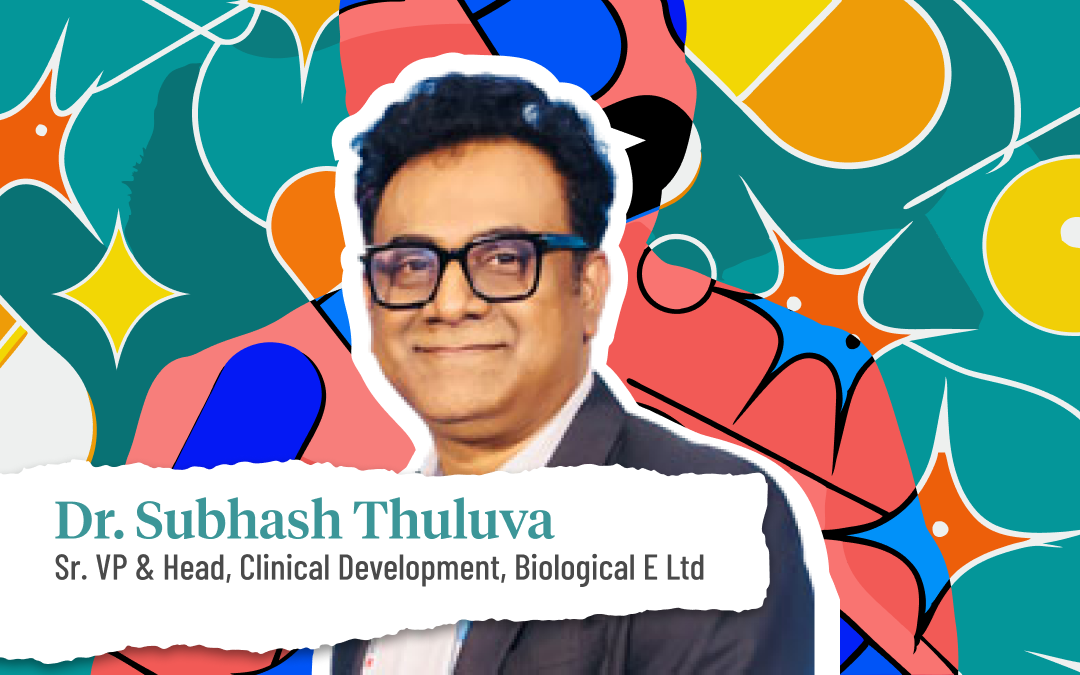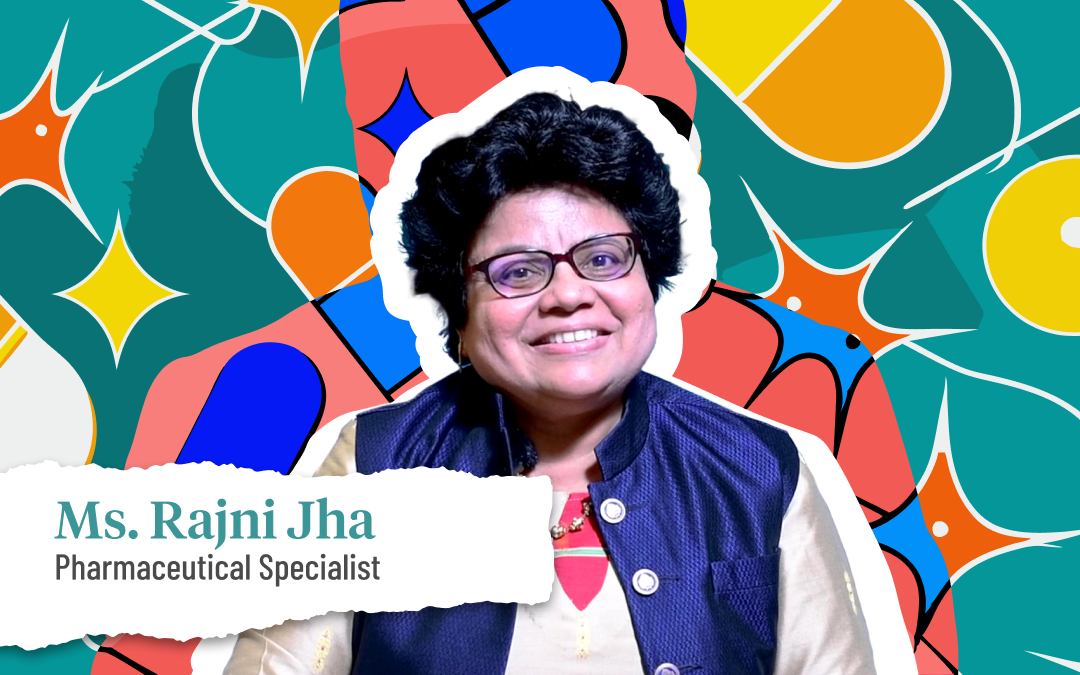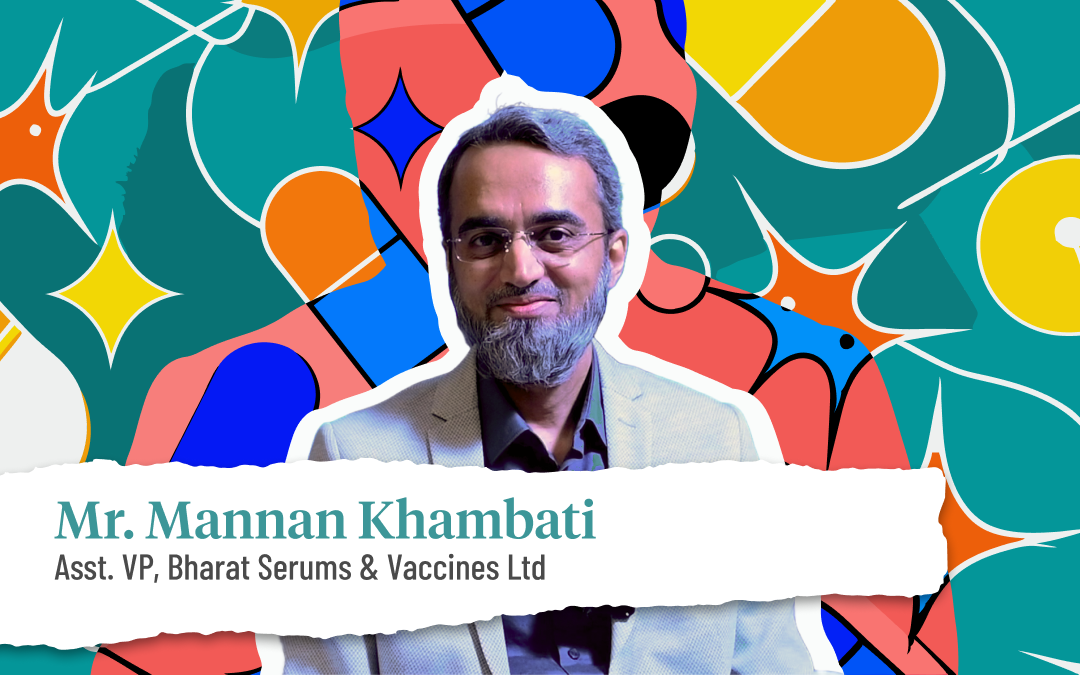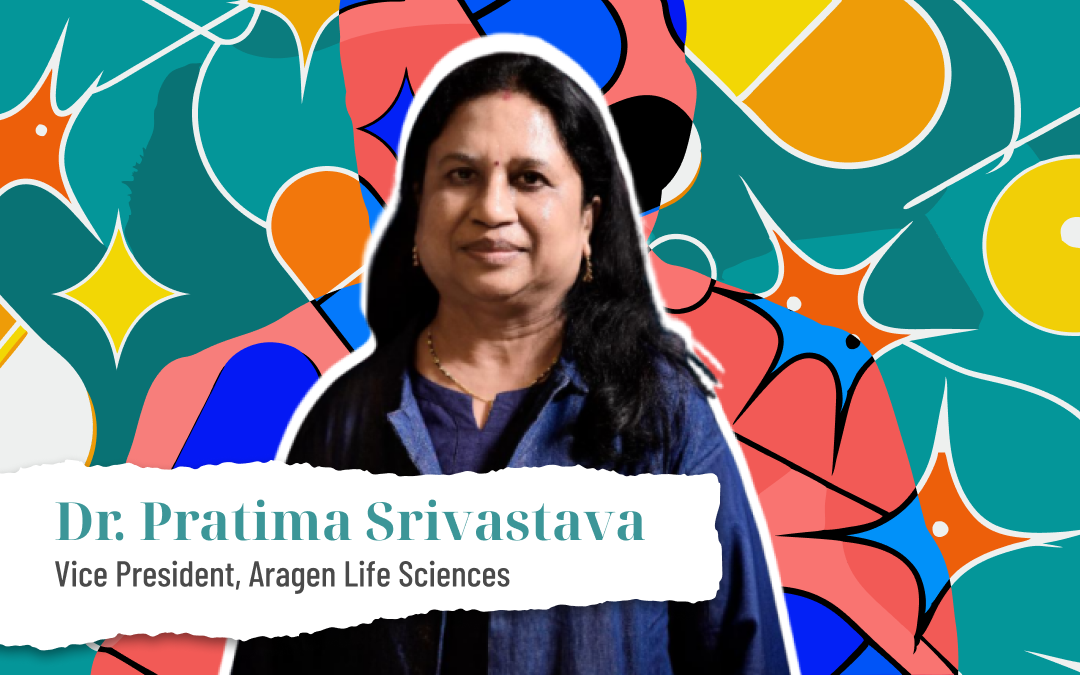QnA
Interview | August 21, 2025
Dr. Abhijit Roychowdhury is the Senior Director at Emcure Pharmaceuticals Ltd., where he brings over 17 years of international experience in pharmaceutical research and development, having led multidisciplinary teams across India and the United States. A Ph.D. in Synthetic Organic Chemistry and a committed research leader, Dr. Roychowdhury has contributed extensively to drug discovery and development, with a special focus on medicinal chemistry, process development, and scalable synthesis of complex small molecules. His work has been instrumental in advancing multiple drug candidates from laboratory benches to clinical trials, demonstrating a consistent ability to translate scientific innovation into therapeutic outcomes.
Pharma Now: Welcome to Pharma Now. On today’s episode, we have with us a person responsible for setting up the API R&D at Emcure Pharmaceuticals, Dr. Abhijit Roychowdhury.
In this conversation, we really want to explore the various facets of the API industry and the R&D side of it. It’s well known that you are the person who established API R&D in India, and you’ve achieved a lot of remarkable milestones there. I also went through your career path; it’s truly inspiring, from your time in the US to setting things up in India, and then building your complete career here. It’s really fantastic.
So, we want to unfold that journey. But before we get into it, I think it’s important for everyone to first understand APIs. Because for different people, “API” might mean different things. So, could you start by explaining what exactly an API is all about?
Dr. Abhijit: API is basically an Active Pharmaceutical Ingredient. The capsule or tablet that you take every morning or night has two major components. One is the chemical matter that actually works that’s the active part. The other is something we classify as excipients. These are responsible for the delivery, improving bioavailability, or even enhancing taste in the case of children’s medicines. For example, you might have an orange-flavored cough syrup. A bronchodilator like Salbutamol could be the active ingredient, but you need to sugarcoat it or add flavors. That non-API part is what we call excipients.
Pharma Now: Is it difficult to discover or create an API?
Dr. Abhijit: You have to be trained in a certain way. To be successful in the API industry, whether in manufacturing or process development, you need a strong chemistry background. Some people dislike chemistry, so for them it’s very difficult. But if you enjoy it, it can actually be quite rewarding. You receive training and build expertise as you move forward. Still, it’s a highly specialized field and requires years of learning before you can truly develop, understand, and deliver.
Pharma Now: I’ve always heard that India is still evolving in terms of discovering new APIs. That’s where my question comes from.
Dr. Abhijit: Right, so these are actually two different things. When we talk about “discovery,” we mean innovative products. Very few drugs have been discovered in India so far.
When we say API, Active Pharmaceutical Ingredient, in most cases we’re looking at it from a generic perspective. That means an innovative company elsewhere, usually in the US, Western Europe, or Japan, first discovered the drug. Once it goes off-patent, it enters the generic field, and that’s where Indian companies often step in as manufacturers of the active ingredient.
That said, India is gradually entering the innovation space. Several companies are now doing strong work in drug discovery, and I believe the next two to three decades will see many more drugs being discovered in India itself. But as of today, most of the drugs we consume were originally discovered in the West, and India primarily serves as the generic manufacturer.
Pharma Now: Sure. What exactly does API R&D do? What are its main functions?
Dr. Abhijit: Continuing from what I was saying earlier, developing an innovative medicine is extremely expensive. It often takes screening or synthesizing 1,000 compounds for just one to become a successful drug. The other 900+ fail, but the cost of that entire process has to be recovered from the one drug that makes it to market
When we move into the generic space, the objective is very different; it has to be affordable and accessible for the masses. That’s where API R&D plays a crucial role. Its primary functions are:
So, API R&D is about making life-saving medicines not only replicable and cost-effective, but also sustainable and safe for both manufacturers and patients.
Pharma Now: I first wanted to understand your journey, how did it all begin? As a child, did you already dream of becoming a pharmacist or working in R&D?
Dr. Abhijit: Not really from that perspective. My father was a physician, so we were always very close to patients, hospitals, and medical discussions. A lot of people in my family are from the medical profession.
Growing up, frankly speaking, I didn’t really know what I was doing. I pursued my education, did a BSc in Chemistry, and started liking it to some extent. Then I did my Master’s, and at that point, I thought that would be the end, I didn’t want to study further.
But friends often play a pivotal role in your career. A couple of my friends convinced me to continue, and circumstances came together where I landed in the US, got into a graduate program, received a few admissions, chose one, and eventually ended up doing my PhD. That’s when things really changed.
Doing a PhD is a life lesson. Anyone who has gone through it will tell you, we fail 99% of the time. That’s why it’s called a Doctor of Philosophy. It’s not just chemistry, physics, or economics; it teaches you life lessons. I learned research, I learned how to solve problems, sometimes even how to pinpoint the right problem to solve.
Of course, I did my PhD in chemistry, specifically organic chemistry, but what I truly took away from it was the ability to identify and solve problems. That philosophy has stuck with me.
From there, I moved into the biotech industry, and then into the pharmaceutical industry, almost by accident. Many accidental steps shaped my path. Looking back, if you asked me whether I would do a PhD again, I’d say yes, even knowing the pain I went through. Research is mind-blowing.
Everybody should spend some time doing it. Discovering something new gives you goosebumps. And when you read about what goes into creating something new, whether it’s a smartphone or a drug, you realize how much it contributes to the betterment of society.
Pharma Now: Wonderful. You’ve been with Emcure for more than a decade now. As Head of R&D, how does your role look today? What does a typical day for you involve?
Dr. Abhijit: Busy for sure—but very enjoyable. I work with colleagues who are extremely passionate, mostly scientists, though even our non-scientific staff share the same commitment. We all work towards a single goal. There’s a saying in pharma: patients are waiting.
Of course, companies will talk about financial goals, KRAs, and so on, but all of that aligns naturally when you know your work serves a higher cause. That understanding elevates us as human beings. So, from morning to evening, we focus on problems, facilitating, troubleshooting, and solving them.
As an R&D organization driven by innovation, hierarchy doesn’t really matter here. We learn from each other, regardless of titles. At the end of the day, when I drive back home, I feel a sense of satisfaction knowing that we’ve contributed to solving problems that will eventually culminate in a product reaching patients.
Pharma Now: I think for an R&D scientist, patience is everything, right? You start a discovery process without knowing if or when you’ll get results; sometimes, the impact may only be seen years later.
Dr. Abhijit: Exactly. That’s what a PhD teaches you. You may spend five or six years trying to solve a single problem, going through rough patches, and often not knowing if you’ll reach the end goal at all. But every failure becomes a stepping stone. There’s a saying: the journey of a thousand miles begins with a single step. That’s how research really works.
Pharma Now: The current world is one of instant gratification. People post a photo on Instagram, and if they don’t get likes quickly, they feel disturbed.
Dr. Abhijit: That’s true, some things today are quick and fast. Of course, there are timelines and targets that must be achieved within a set period. But at the end of the day, it’s not just about speed. It’s about doing it right.
In R&D, that means going through multiple iterations to finally deliver a quality product. Quality is crucial. What we strive for is to find the shortest, most efficient path that still delivers a safe, effective, and affordable product, to patients, to our colleagues, and to our countrymen.
Pharma Now: Sure. So what are the key challenges in R&D in India right now? Many students are interested in the field, but the percentage entering R&D is still relatively low, though it’s improving. What do you see as the main challenges?
Dr. Abhijit: Education is key. During college, students should spend maximum time reading and learning. But I notice today that many are reading less. The more you read, the more you learn, and the more you learn, the better you can connect the dots.
Another challenge is the evolving nature of science. What was cutting-edge 50 years ago is outdated today, and what we do now will be outdated 50 years later. So you have to continuously upskill, unlearn, and relearn. Sometimes this means formal courses; other times, just informal, self-driven reading.
Students must stay abreast of current trends, technologies, and advanced tools that are reshaping R&D. That adaptability is essential, because our field is always changing.
Pharma Now: Certainly. And in your journey, who have been your inspirational figures? People you look up to?
Dr. Abhijit: There are many. Being in the discovery space, I’ve always admired great chemists. Chemistry is fascinating because every aspect of our lives is connected to it. Over the years, chemists have shaped science, from developing simple molecules and drugs to creating complex therapies like monoclonal antibodies, antibody-drug conjugates, or APIs requiring 70+ synthetic steps.
I’ve also been inspired by Nobel laureates and pioneers who discovered new reactions, like carbon bond formations or soluble metal catalysis. These are fundamental breakthroughs that drive real-world applications. So, for me, scientists as a community are deeply inspiring. They may not be as glamorous as Hollywood stars, but they truly change the world in ways that directly impact our lives.
Pharma Now: But you have a glamorous Executive Director. How has your experience been working with her?
Dr. Abhijit: She’s a true visionary. She (Namita Thapar) has done a tremendous amount for the pharma industry and has expanded our company significantly. While in R&D, we don’t interact with her on a day-to-day basis, she serves as a guiding light for all of us moving forward.
Pharma Now: And did you get a chance to work closely with the senior leadership?
Dr. Abhijit: Yes, Mr. Satish Mehta, our MD & CEO, is very active. We do work with him, and his involvement is quite inspiring.
Pharma Now: Very interesting. It’s been wonderful talking to you and learning about your journey. Before we close, what would be your one piece of advice for aspiring R&D professionals who look up to you and dream of bringing something new to the market?
Dr. Abhijit: I would say, be true to yourself. Be thorough in what you do. You don’t need to be a jack of all trades; no one knows everything. What’s important is to build the right network, so you can bring in the right resources when needed. If you stay honest to your learning and your work, the outcomes will always be fruitful.
Pharma Now: That’s a great piece of advice. Thank you so much, sir, for sharing your time and insights with us today.
Dr. Abhijit: Thank you. My pleasure.

FT - Dr. Subhash Thuluva

FT - Ms. Rajni Jha

FT - Mr. Mannan Khambati

FT - Dr. Pratima Srivastava

FT - Dr. Subhash Thuluva
Dr. Subhash Thuluva, Senior VP at Biological E, shares his 25-year journey in clinical development, ...

FT - Ms. Rajni Jha
Ms. Rajni Jha, a seasoned pharmaceutical specialist, shares her journey from the lab to becoming a l...

FT - Mr. Mannan Khambati
Mr. Mannan Khambati, AVP of Biotech Manufacturing at Bharat Serums and Vaccines, shares his inspirin...

FT - Dr. Pratima Srivastava
Dr. Pratima Srivastava, Vice President at Aragen, shares her remarkable journey from aspiring scient...